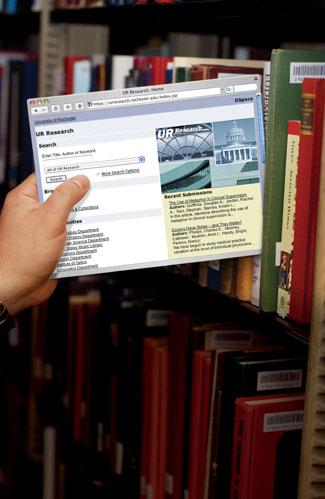


The Digital ‘Stacks’

Looking online for the data that went into the very latest research? Or for a work in progress? Getting access to such scholarly and academic treasures may soon be easier, thanks to UR Research, an initiative led by University Libraries.
Rochester was one of the first universities invited to join a handful of leading institutions to develop the digital storage system based on software pioneered by Hewlett-Packard and the Massachusetts Institute of Technology.
The new service, opened to the public last spring, preserves and organizes data, papers, and other digital materials in a long-term storage system. Scholars who once stored their research and published papers on their personal computers can now upload files to the database, where their colleagues can access the materials, including the latest research.
Anthropologist Nancy Foster, who conducted a study to find out how faculty stored their work and how to encourage them to put their files online, says the draw of UR Research is the ability to make faculty members' scholarly work more readily available for review and download by their peers.
""hey want to do their work, they want other people to read it and cite it, so that other people can make progress in the field," says Foster.
Users also can access a variety of collections, including antique music scores from the Eastman School's Sibley Music Library, historical photographs, and antique advertising cards for medicines from the Miner Library collections, and download the materials.
Interest has been increasing since the system's launch, says Suzanne Bell, librarian for economics and data. "From the end of January through August 2005, musical scores were downloaded more than 43,000 times. There were 731 downloads in just the first two days of August."
The goal now is to get more faculty, staff, and students to use the system. To accomplish that, Bell says she and others working on the project will assist users, uploading materials for them and ensuring that publishers' rules regarding the uploading of documents are followed.
Bell hopes that the collections, as well as the available server space for streaming audio and video, will encourage more people to use the system. In addition, Foster plans to conduct followup research to find out how users are adapting to the system and get feedback on how to improve it.
